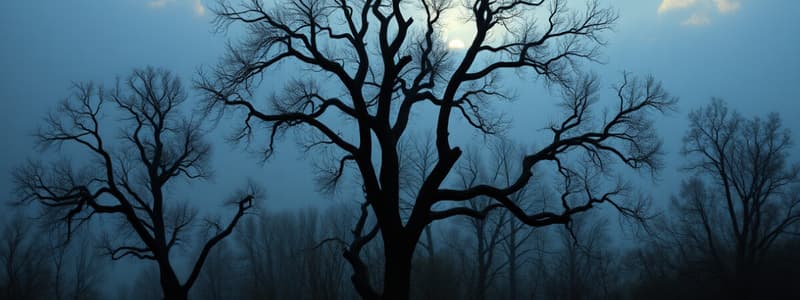Podcast
Questions and Answers
What is the primary focus of cinematography?
What is the primary focus of cinematography?
Which term describes the horizontal movement of the camera?
Which term describes the horizontal movement of the camera?
Which film genre focuses primarily on character development and emotional narratives?
Which film genre focuses primarily on character development and emotional narratives?
What adjective would best describe a film that evokes strong emotional responses such as sadness or grief?
What adjective would best describe a film that evokes strong emotional responses such as sadness or grief?
Signup and view all the answers
Which shot type balances the subject and background?
Which shot type balances the subject and background?
Signup and view all the answers
What term describes films that combine elements from two or more genres?
What term describes films that combine elements from two or more genres?
Signup and view all the answers
Which adjective best describes a film that leaves a significant impression and is innovative?
Which adjective best describes a film that leaves a significant impression and is innovative?
Signup and view all the answers
What kind of lighting creates a specific mood and atmosphere in a film?
What kind of lighting creates a specific mood and atmosphere in a film?
Signup and view all the answers
Study Notes
Cinematography
- Definition: The art and technique of capturing motion pictures.
-
Key Elements:
- Framing: Composition of shots; affects focus and interpretation.
- Lighting: Use of natural or artificial light to create mood and atmosphere.
-
Camera Movement:
- Pan: Horizontal movement of the camera.
- Tilt: Vertical movement of the camera.
- Zoom: Adjusting the camera's focal length.
-
Shot Types:
- Wide Shot: Captures a broad view of the scene.
- Close-Up: Focuses on a subject, emphasizing detail.
- Medium Shot: Balances the subject and background.
- Aspect Ratio: The ratio of width to height of the image; influences visual storytelling.
Film Genres
- Definition: Categories that define the style and content of films.
-
Common Genres:
- Action: High-energy, fast-paced films; often include stunts and physical feats.
- Drama: Focus on character development and emotional narratives.
- Comedy: Aims to provoke laughter; includes various sub-genres (romantic, slapstick).
- Horror: Designed to scare and create suspense; often includes supernatural elements.
- Science Fiction: Explores futuristic concepts, technology, and often speculative ideas.
- Documentary: Non-fiction films that document reality for historical, educational, or artistic purposes.
- Animation: Films created using animated imagery; can be for children or adults.
- Hybrid Genres: Combines elements from two or more genres (e.g., Romantic Comedy, Sci-Fi Horror).
Adjectives to Describe Films
-
Visual Qualities:
- Stunning
- Gritty
- Vibrant
- Dark
- Atmospheric
-
Narrative and Themes:
- Thought-provoking
- Engaging
- Predictable
- Complex
- Clichéd
-
Emotional Impact:
- Heartwarming
- Tear-jerking
- Tense
- Uplifting
- Disturbing
-
Pacing:
- Slow-paced
- Fast-paced
- Meandering
- Taut
-
Overall Impression:
- Masterful
- Mediocre
- Groundbreaking
- Forgettable
- Overrated
Cinematography
- Art and technique of capturing motion pictures through visual storytelling.
- Framing: The way shots are composed to guide viewers' focus and interpretive responses.
- Lighting: Vital for establishing mood and atmosphere; can be natural or artificial.
-
Camera Movement:
- Pan: Rotating the camera horizontally to follow action.
- Tilt: Moving the camera vertically to change perspective.
- Zoom: Adjusting focal length to bring the subject closer or farther away.
-
Shot Types:
- Wide Shot: Provides a broad view, establishing the environment.
- Close-Up: Centers on a subject, highlighting specific details.
- Medium Shot: Balances both subject and background elements.
- Aspect Ratio: Width-to-height ratio of the image; influences how stories are visually perceived.
Film Genres
- Categories that define the style, content, and conventions of films.
-
Common Genres:
- Action: High-energy films featuring stunts and intense physical activity.
- Drama: Emphasizes character development and emotional storytelling.
- Comedy: Seeks to entertain and amuse, encompassing various sub-genres like romantic and slapstick.
- Horror: Designed to evoke fear and suspense, often includes supernatural themes.
- Science Fiction: Explores futuristic themes, technology, and speculative concepts.
- Documentary: Non-fiction portrayal of reality for educational, historical, or artistic insight.
- Animation: Films created with animated imagery, suitable for a range of audiences.
- Hybrid Genres: Combines elements from multiple genres, such as Romantic Comedy and Sci-Fi Horror.
Adjectives to Describe Films
-
Visual Qualities:
- Stunning, gritty, vibrant, dark, atmospheric.
-
Narrative and Themes:
- Thought-provoking, engaging, predictable, complex, clichéd.
-
Emotional Impact:
- Heartwarming, tear-jerking, tense, uplifting, disturbing.
-
Pacing:
- Slow-paced, fast-paced, meandering, taut.
-
Overall Impression:
- Masterful, mediocre, groundbreaking, forgettable, overrated.
Studying That Suits You
Use AI to generate personalized quizzes and flashcards to suit your learning preferences.
Description
Test your knowledge on the art of cinematography and various film genres. This quiz covers key elements such as framing, lighting, and camera movements, along with definitions and examples of popular genres. Explore how these aspects contribute to effective storytelling in cinema.



